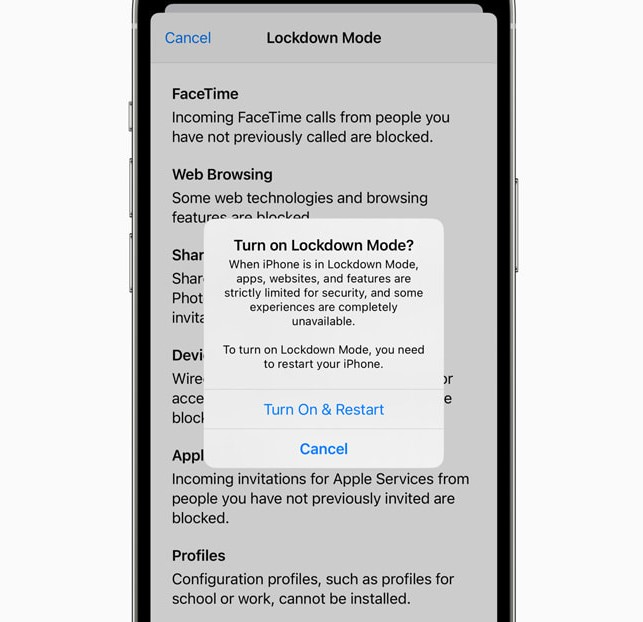Apple has announced Lockdown Mode, an “extreme” level of security designed for a “very small number of users who face grave, targeted threats.” It will be available this fall when the company rolls out iOS 16, iPadOS 16 and macOS Ventura.
The company says it created Lockdown Mode to help protect high-profile people who, because of their status or job, might be personally targeted by malware developed by the likes of NSO Group, which is behind Pegasus, or other state-backed groups. Switching on Lockdown Mode will severely restrict the functions of an iPhone, iPad or Mac to limit possible entry points for spyware.
In Messages, for instance, most attachments other than images will be blocked. The same goes for link previews. Lockdown Mode will prohibit incoming FaceTime calls and other invites, unless it’s from a person you’ve previously called or shared an invite with. Wired iPhone connections with computers and accessories will be disabled when the device is locked.
Apple will also block some web technologies, such as just-in-time JavaScript compilation, unless you manually approve a site. It will also not be possible to install a configuration profile or add a device to mobile device management when Lockdown Mode is enabled. A screenshot notes that “some experiences” will be unavailable entirely.

Apple
The company says all these protections will be available when Lockdown Mode launches. It plans to add more over time. Apple will also expand its Security Bounty program. Researchers who find weaknesses in Lockdown Mode and help Apple make it more secure will be eligible for rewards of up to $2 million.
“Apple makes the most secure mobile devices on the market. Lockdown Mode is a groundbreaking capability that reflects our unwavering commitment to protecting users from even the rarest, most sophisticated attacks,” Ivan Krstić, Apple’s head of security engineering and architecture, said. “While the vast majority of users will never be the victims of highly targeted cyberattacks, we will work tirelessly to protect the small number of users who are. That includes continuing to design defenses specifically for these users, as well as supporting researchers and organizations around the world doing critically important work in exposing mercenary companies that create these digital attacks.”
Apple sued NSO Group last year to “hold it accountable” for states that target and spy on its users. The company says it’s donating $10 million, as well as any damages it receives as a result of the suit, to organizations that “investigate, expose, and prevent highly targeted cyberattacks.” Grants will be made through the Ford Foundation’s Dignity and Justice Fund.
All products recommended by Engadget are selected by our editorial team, independent of our parent company. Some of our stories include affiliate links. If you buy something through one of these links, we may earn an affiliate commission.